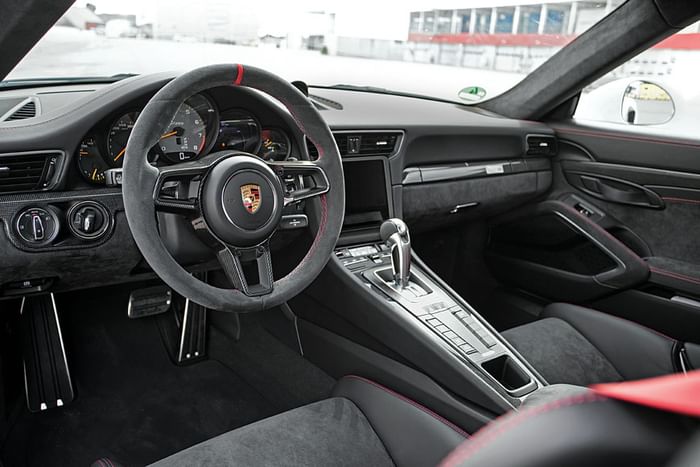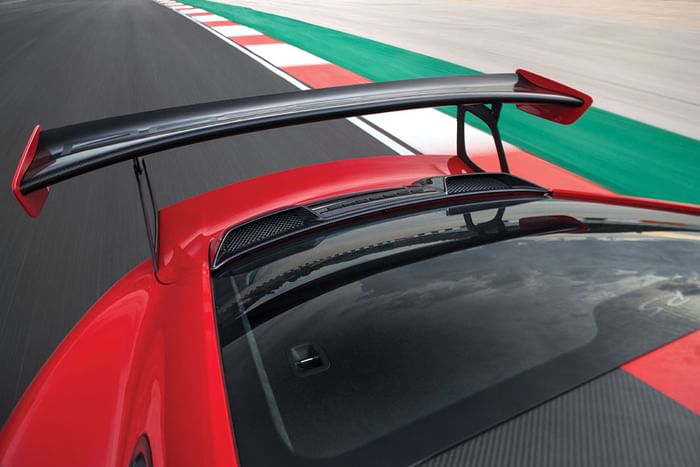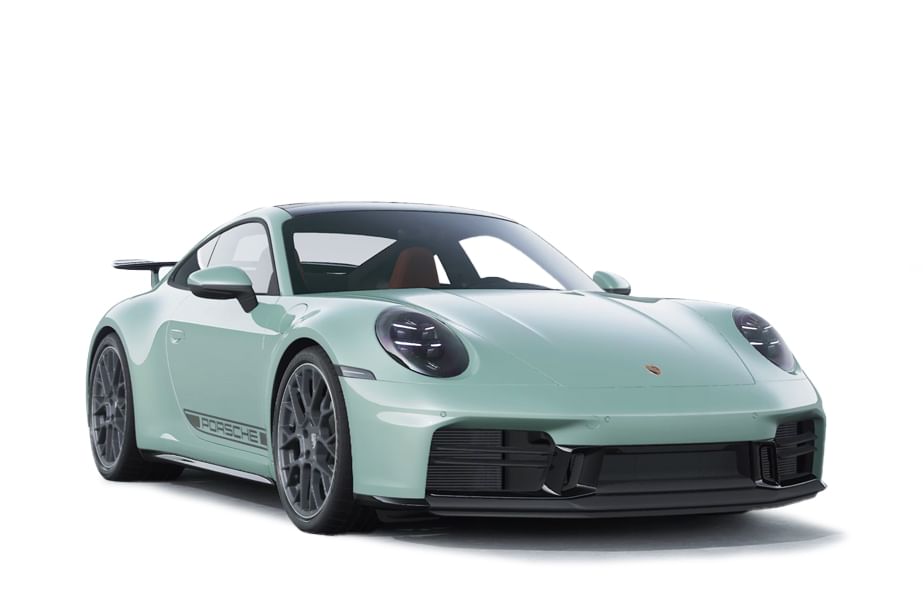2018 Porsche 911 GT2 RS review, test drive
The Porsche GT2 RS is only the most powerful 911 ever built and only the fastest road car ever. We get to drive one in Germany.
Published on Jul 10, 2018 12:30:00 PM
19,254 Views
Follow us on

I've been assigned the GT3 RS Touring, and while that’s a phenomenal 911, I also want the GT2. It’s only the most powerful 911 ever built, only the fastest series-production, street-legal car around the famed Nürburgring, and with its lavish carbon-fibre bits, massive rear wing, a chin spoiler that could double as a bulldozer’s shovel and ducts the size of escape hatches, the GT2 has made me completely weak in the knees.
I’m actually not a very big fan of vents and sprouted bits, and you’d think the classic 911 silhouette wouldn’t wear them well, but the RS looks simply stunning. Plus, they play important roles in the RS’ performance. The two bonnet vents feed cool air directly onto the brakes and the fender ducts release air from the wheel arches to reduce pressure and lift. The massive air intakes at the front and behind the doors provide for the massive cooling requirement, as does the additional air vent just below the bonnet. This along with the large chin spoiler also increases downforce at the front. At the rear, the two ram air scoops feed the engine air for combustion, and there’s a large fixed wing propped up on forged aluminium supports, which besides looking boy-racer cool, can develop about 340kg of downforce at 340kph. This can go up to 450kg when tuned for racing.
What really adds to the car’s stun factor is the bold red colour with a lot of black contrast bits thanks to the liberal use of carbon fibre. The bonnet is, in fact, black carbon fibre with a red stripe painted on.
| Porsche 911 Price, Mileage, Specifications, Features and Variants | |
|---|---|
| Brand | Porsche |
| Model Name | 911 |
| Porsche 911 Price | ₹ 2.44 - 3.27 crore |
| Porsche 911 Range/Mileage | Petrol Hybrid : 9.34kpl | Petrol : 9.62kpl |
| Porsche 911 Specifications | Coupe/Convertible | 2 doors | 2 seats View All Specs |
| Porsche 911 Features | LED headlight | 10.9-inch Touchscreen display | 6 airbags View All Features |
| Porsche 911 Variants | Carrera | Carrera 4 GTS View All Variants |
I’m raring to go now, but before I can blast off there’s photography to do. So my first few moments with the GT2 are spent following the tracking car. I’m expecting a hyper terrier snapping at its leash but I have no trouble following photographer Marcus’ instructions to come in closer, push back, etc. The supercars of today are getting increasingly easier to drive, but given the stratospheric levels of performance in the RS, its ability to dial it all down is amazing. The prodigious amounts of torque mean the RS can easily potter along in a higher gear, with the engine map feeding in power in a nice and controlled manner.
The ride comfort is also a surprise. It doesn’t feel wayward or bone-jarring even over slightly uneven surfaces – and that’s saying something; everything from the springs, dampers and anti-roll bars have been fettled with performance in mind, and can also be further adjusted for racing. Take, for instance, the fact that for a firmer feel, all the chassis joints have been replaced by steel ball joints; a first for a Porsche road car. Given the performance balance Porsche has managed, I’m sure this won’t be the last, either.
Once the photography is done, I can drive on my own, and I can’t breathe with the excitement considering these numbers – 700hp, 0-100kph in 2.8sec, a top speed of 340kph, and, of course, a 6min 47.3sec lap time at Nürburgring.
And so I find a nice stretch of empty tarmac and floor the accelerator. And wham! I discover it isn’t the accelerator pedal I’ve just mashed down on, but the wrap speed switch. In what feels like a blink of an eye, I’ve shot past the 100kph mark and I’m still hurtling on, unrelenting, past 200kph. My eyes have trouble providing me blur-free vision, and, after a few bursts like this, I’m actually nauseous. But do I stop? Heck no! I’ve had no lunch to lose in any case. What will also egg you on is the soundtrack which can be set free with the exhaust switch that opens out the valves for a nice loud roar.
I’ve been lucky enough to drive some pretty fast supercars but the manner and time in which the GT2 delivers its speed is simply insane – the official time to 200kph is 8.3sec. Keep the throttle of the 3.8-litre flat-six twin-turbo engine pinned and the power just keeps coming; it’s mind numbingly quick. While the turbos do create a wee bit of lag (perfectly acceptable), the power delivery is simply fast and very linear all the way to the 7,200rpm rev limit. It’s hard to imagine that this 3.8-litre block first came out in 2009 putting out 500hp.
Porsche’s PDK transmission is equally impressive too; it’s possibly the fastest-shifting unit there is. The seven-speed ‘box sends all the power to the rear wheels and it’s virtually impossible to detect any interruption as it goes through the cogs. Braking, however, brings out really nice and punchy shifts – especially in PDK Sport mode.
Given this car’s turn of speed, you will be mashing down on the brakes quite often. Besides quick braking, the Porsche Ceramic Composite Discs also aid acceleration and ride, thanks to the lowered unsprung weight – about half of typical cast iron discs.
And speaking of weight, the GT2 I’m driving is on a special diet. The automatic climate control system has been deleted as has the audio and communication system. Plus, it gives the roll cage (which can be had in steel or titanium) a miss. And if that wasn’t enough, it comes with the Weissach weight-saving package, where certain bits are made of carbon-fibre-reinforced plastic and titanium.
Yes, the GT2 is quick in a straight line, it’s claimed top speed of 340kph puts it on par with its sibling, the 918 Spyder. That relies on a combined effort from its electric motors and petrol engine. But, remember, the GT2 broke the Nürburgring record by about 5sec, which means it can corner, too. So I’m not surprised at the super levels of road grip and sweet handling on the twisty back roads, also due in no small part to the four-wheel steering. It’s nice that the steering feels perfectly weighted and you know exactly what the wheels are doing.
This is a GT2, and while it does stick to the formula of more power from a turbo engine, a motorsports chassis, light weighting and rear drive only, it comes with all the electronic aids like ABS, traction control, electronic stability control, Porsche Active Suspension Management (PASM) and torque vectoring. I guess, without these aids, it would be far too dangerous to sell the car to anyone for use on public roads.
However, just as fast as the RS goes, so does my time with it. I would have loved to spend more time inside, also quite simply to poke around and see what’s on offer. There is liberal use of Alcantara and carbon fibre, and a neat, sporty red marking for the top centre of the steering, behind which are the traditional five Porsche dials. The seats here are full buckets with manual fore and aft adjustment, while height can be adjusted electrically. Oh, you also get retractable cupholders.
So a day spent driving the GT2 and following it around has left me in no doubt that this is the 911 to have. It may not be everyone’s choice – there are many who say they’d prefer the GT3 which I also drove – but, for me, the sheer lunacy of the RS’ performance, along with its wild looks, wins the day.
Tech Specs 
Copyright (c) Autocar India. All rights reserved.










 Price
Price Engine
Engine Transmission
Transmission Acceleration
Acceleration Body
Body Suspension
Suspension Dimensions
Dimensions
Comments
Member Login
Personal Details
No comments yet. Be the first to comment.